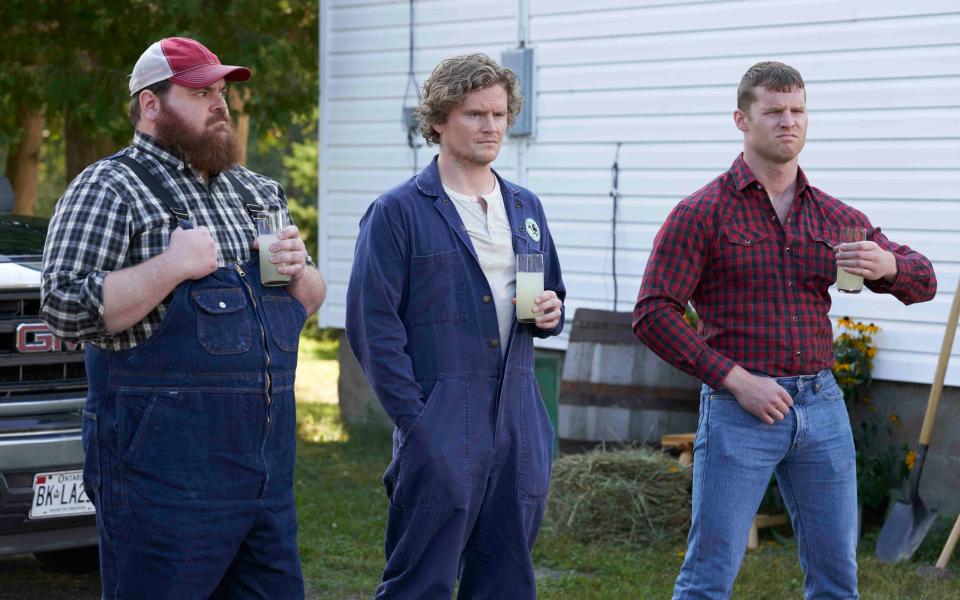Oh, Canada: Why The Nation’s Creative Sector Is On Tenterhooks Months After The U.S. Strikes Drew To A Close
- Oops!Something went wrong.Please try again later.

Canada is the nation that brought Schitt’s Creek, Run the Burbs and Letterkenny into the world, but it has been a rough period for a country that peered over the border last year and watched the worst U.S. strike action for a generation.
Talks between the Canadian Media Producers Association (CMPA) and the Writers Guild of Canada (WGC) over a new Independent Production Agreement (IPA) have resumed, amid tensions around falling fees, mini-rooms and AI, and we have spoken to multiple connected sources to assess the state of play.
More from Deadline
Negotiations restarted this morning, we hear, after a first round of bargaining between the two sides ended without a deal on November 23.
The CMPA and WGC have been looking to strike a new three-year IPA since October, and, whisper it, fears about a strike have lingered in the background.
It’s not panic stations yet and the latest we’ve heard out of Canada this week is increasing optimism a deal will be struck, but the threat of action is certainly real to several sources we’ve spoken to for this article. This has been made starker by the reality of the bruising actors and writers strikes that took place south of the border last year.
Getting inside the talks has been challenging for reporters as the CMPA and WGC agreed to a media blackout, but we’ve built a picture of the concerns on both sides.
There have been signs of unrest. In December, more than 100 live-action and animation screenwriters signed an open letter to the CMPA urging its negotiating team to “engage with our bargaining committee in a respectful and good faith effort to address the needs of writers and creators in a swiftly changing world.”
The Alliance of Canadian Cinema, Television and Radio Artists, the Directors Guild of Canada, the International Alliance of Theatrical Stage Employees and media technicians union NABET 700-M UNIFOR have each thrown their weight behind the WGC’s demands, similar to how the WGA, DGA and SAG-AFTRA supported each other in 2023.
Will there be a strike?
If the current production agreement is not renewed and intermediaries cannot find a way forwards, a strike can be called. Should this scenario play out, the government would be informed and action would begin 15 days later.
Sources from the Canadian production and writing communities are proceeding cautiously, but most believe a compromise will be achieved. “This is Canada, not Hollywood,” says one speaking on the condition of anonymity, who contrasted the tone of the talks with those in the U.S.
“Nobody wants to be in a strike situation,” says Dan Bennett, Partner and Executive Producer at Shelved and One More Time maker Counterfeit Pictures. “It’s a tenuous time for the industry, and none of us can afford to shut down.” However, a CEO of a leading Canadian scripted indie sums up a nagging feeling: “The worry is real.”

On the table are several live issues such as minimum script fee increases for scripted projects and animation, writers room staffing and AI guarantees. “There are certain things similar to the WGA’s demands: the idea of writers rooms — how many weeks we spend in there and the number of people in the room,” Anthony Q. Farrell, the writer and creator of CTV comedy Shelved, notes. “These keep shrinking and we need minimums in those areas. Everyone assumed there would be fair play about certain things, but things are getting squeezed.”
Farrell, a writer on The Office and one of Canada’s most prominent showrunners, was among those who signed the open letter to the CMPA late last year, and he is well positioned on both sides of the fence as he also runs an indie, Canfro Productions. Many writers in Canada’s collegiate production sector also act as producers, and have memberships for both the CMPA and WGC, adding a layer of complexity to the negotiations.
Unlike the AMPTP, the CMPA does not represent Canada’s networks and streamers, which means residuals aren’t a factor in the talks. We understand writer remuneration is usually negotiated directly with the broadcaster or filmmaker for each project. While this is one financial headache removed for producers, the CMPA’s positioning can have its downsides for producers. “We see ourselves caught in the middle of the broadcasters and the guilds,” says one member indie with knowledge of the talks.
However, as one producer notes, the CMPA’s members “are not massive, global streaming studios, so it’s a very different environment” for talks. “My hope is there’s not the equivalency [with the U.S. situation],” they add.
On the AI front, Canadian TV trade Playback has reported that the WGC’s demands are “substantively the same” as those the WGA achieved in talks with the AMPTP. That agreement dictates that “AI can’t write or rewrite literary material, and AI-generated material will not be considered source material.”
Farrell says: “Writers don’t want to get to a place where producers are using AI to write first drafts and taking away opportunities.”
Canadian animation has always thrived and another issue is that of repayments to animation scribes. We understand that these writers do not receive production fees for their scripts, which has knock-on effects. Without increased minimum fees, writers fear they will not be able to sustain careers and those in the early stages of their writing lives won’t break into the big time.
“We continue under a cloud”
Zooming out, there is a sense among sources that Canada’s creative sector is on a bit of a downhill trajectory, at least for now, with very few buyers commissioning at a steady rate. Streamers are inactive on the greenlights front and ongoing government media law changes have added to the perception of a stalling market. The country’s tax incentives will always make it a great choice for international producers and ‘CanCon’ local content rules mean broadcasters have to invest in Canadian content, but barely anyone we’ve spoken with sees the current situation as healthy.
Among the most critical issues is that the introduction of Canada’s Online Streaming Act (aka Bill C-11) has led the SVoDs to effectively stop commissioning altogether, as they wait to see what level of investment they are required to make and how. The legal process has been glacial, broken into three stages, and informed sources say there’s very little likelihood of a final decision until 2025. “Until then, we continue under a cloud,” says the CEO of one major Canadian content business.
“The big problem is the industry is shrinking at a ridiculous rate,” says Farrell. “Producers aren’t making money, so you wonder how they can pass money on. The system is broken right now and hopefully C-11 will help to bring it back to levels from 10 years ago.”
At a Canadian Radio-Television Telecommunications Commission (CRTC) hearing about the act in November, Netflix’s Director of Public Policy for the country, Stéphane Cardin, said the streaming levy should be no higher than 2% of annual revenues. The streamer alone claims to have spent C$5B ($3.7B) on Canadian productions such as Tall Pines and Just For Laughs comedy specials, while Prime Video has ordered shows such as a revamped Kids in the Hall and LOL: Last One Laughing. At last year’s Banff World Media Festival, Paramount+ unveiled a development slate including Farrell’s scripted comedy Hate the Player: The Ben Johnson Story.

The current situation is challenging for producers and writers we’ve spoken to. Disney+ has completely paused commissioning in the country, while Netflix and Prime Video appear to be prioritizing Canada as a production services territory. Amazon recently took a huge sound stage at Pinewood Studios Toronto, while Netflix has expanded its space at Cinespace Film Studios in the same city and also has sound stages at Pinewood. Apple TV+ is believed to have feet on the ground, but is largely only assessing the originals market at this stage. What Paramount Global CEO Bob Bakish’s admission this week that the company is refocusing to make “fewer local, international originals for our platforms” (apart from for its free-to-air channels in the UK, Australia, Argentina and Chile) means isn’t yet known.
In general, producers believe local streamer commissioners are acting in good faith and remain keen to order content, but are hamstrung by global strategies above their pay grade. We hear many streamer projects are currently stuck at development stage, and several producers tell us that CBC and Crave-owner Bell Media are really “the only game in town right now.” But even the broadcasters are “pulling in their horns” due to a plethora of challenges, our CEO source says.
The future of the streamers in Canada is one thing, but for now eyes are on the WGC, CMPA and the battle to avoid the type of industrial action that rocked Hollywood last year.
The good news is the relative size of the market means the desire to do a deal is strong. “The CMPA has a relationship with the unions, and there’s a sense of community in Canada,” says Counterfeit’s Bennett. “Producers aren’t faceless here. We are in the trenches with them a lot of the time.”
The CEO concurs, noting the rough climate but floating that “the last thing producers, writers and the rest of the casts and crews want is another labor stoppage. We’ve got to hope everybody is wise enough to put some water in the wine.”
Negotiations have restarted, and the determination to improve a once-thriving sector and return it to its heyday is plain for all to see.
Best of Deadline
TV Cancellations Photo Gallery: Series Ending In 2024 & Beyond
2024 Premiere Dates For New & Returning Series On Broadcast, Cable & Streaming
Hollywood & Media Deaths In 2024: Photo Gallery & Obituaries
Sign up for Deadline's Newsletter. For the latest news, follow us on Facebook, Twitter, and Instagram.

